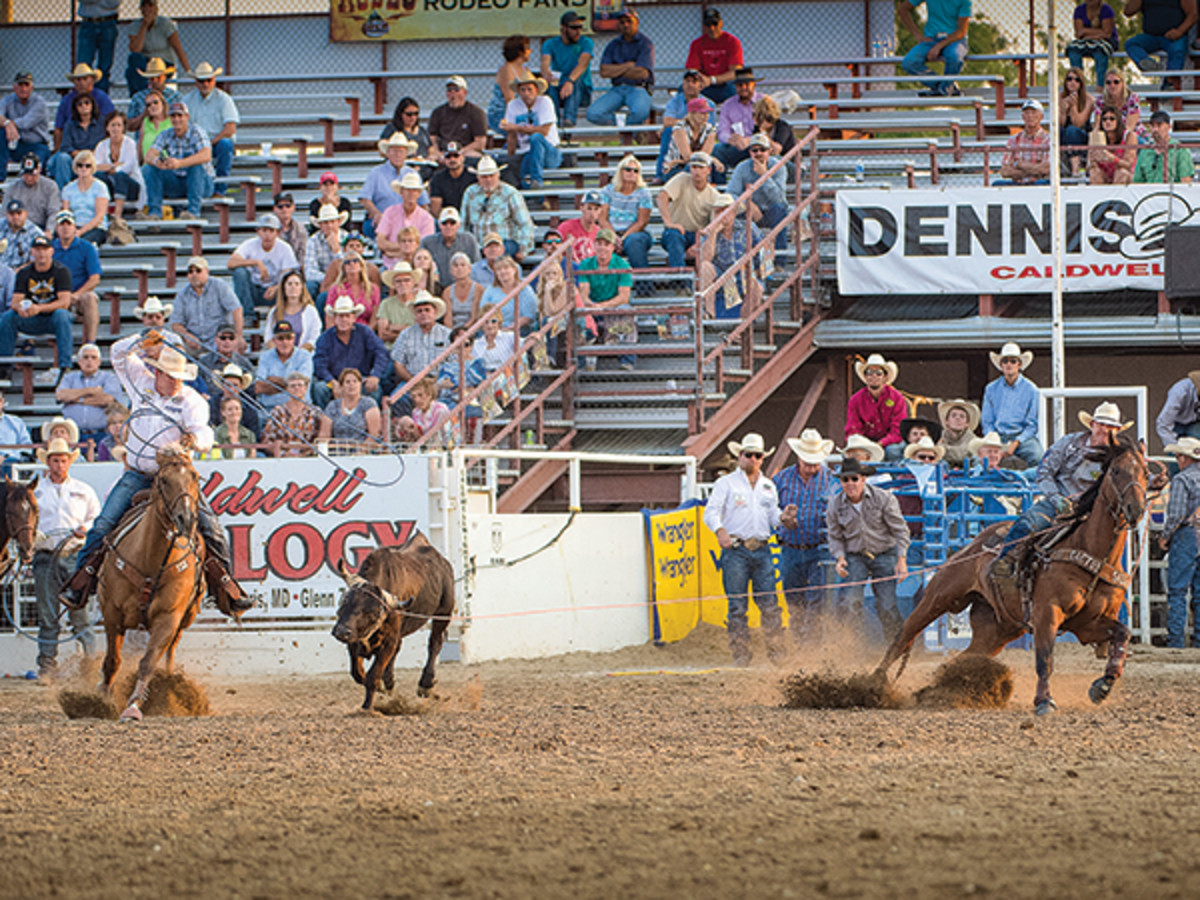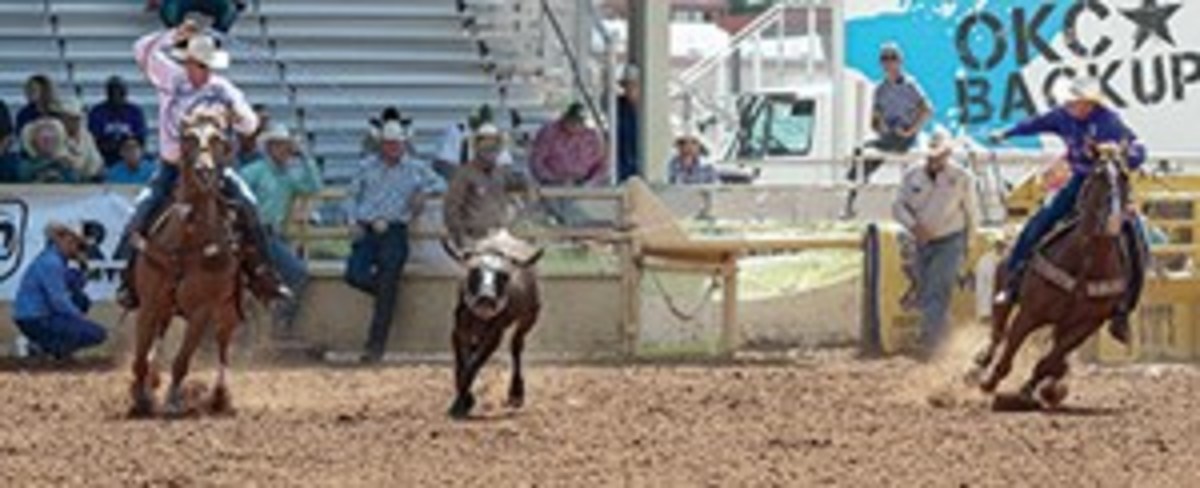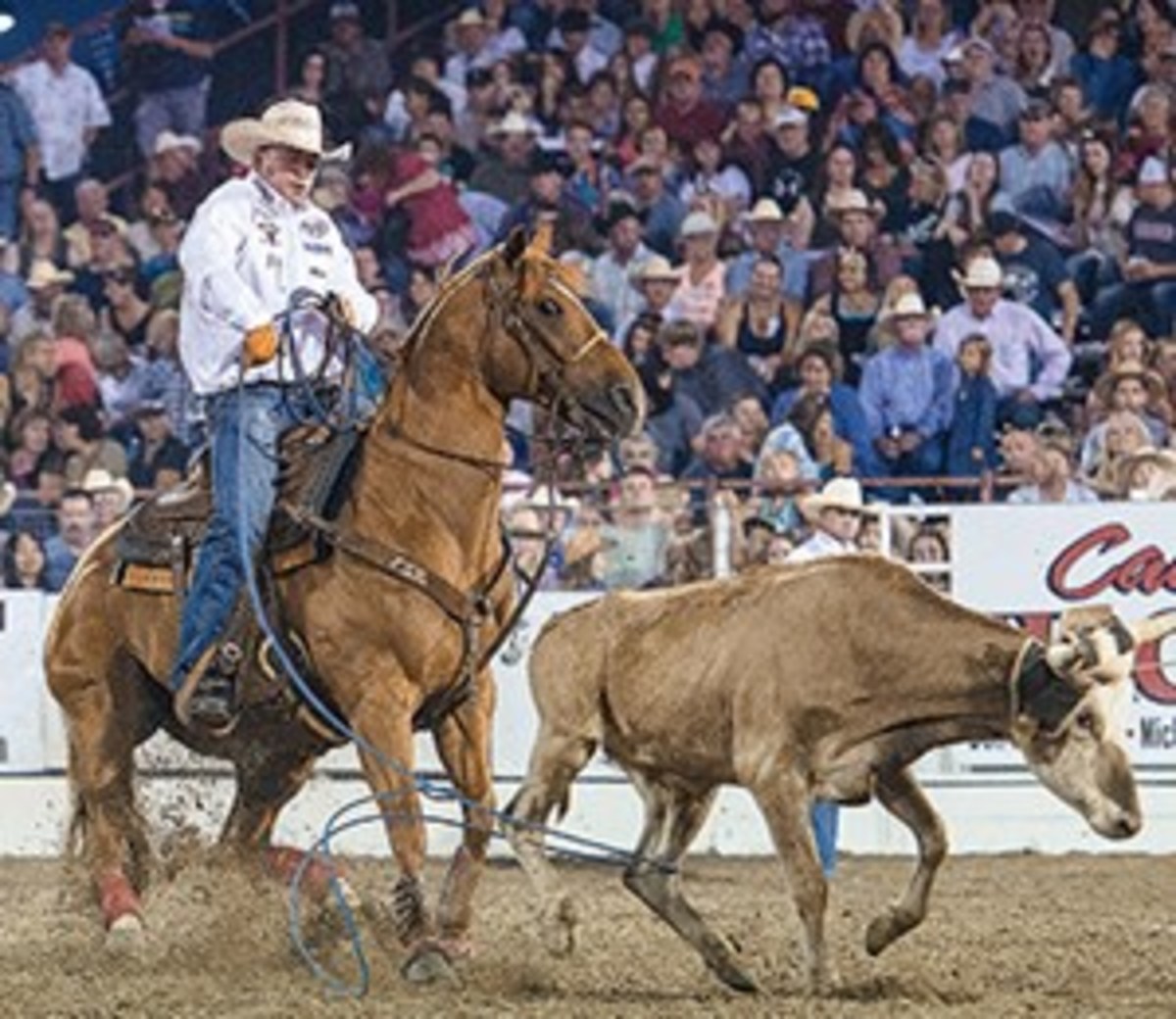
Photos by Kirt Steike
Oh, the difference a year can make.
At the 2014 Lea County Fair and PRCA Rodeo in Lovington, New Mexico, Chad Masters and Clay O’Brien Cooper won the first round, and then, just as Cooper threw his loop in the second round, the steer threw itself down, and Cooper came up empty handed.
At that same rodeo in 2015, Masters and new partner Travis Graves roped their first steer in 5.4 seconds to place third in the first round, and then, just as Graves threw in the second round, the steer threw itself down, and Graves somehow came up with two feet. That’s just how this year has gone for the two of them, with both sitting in the top five in the world standings at press time.
“What was different this year?” Masters asked. “I don’t understand it and I don’t get it—do you?! I don’t know if it’s luck or what, but there’s nothing different except the outcome. I needed to win so bad last year, and I tried hard. I needed to win so bad this year, too, and I’m trying just as hard.”

Masters, who finished the last two seasons outside the top 15, is more puzzled than anybody about his return to the top five in the world in 2015. He’s spending the same time in the practice pen, working on the same fundamentals. He’s approaching things, mentally, with the same intense but practical way he always has. And he’s on a greener horse than he’s ridden the last few years. In 2015, he’s roping with Graves, who is having perhaps the best year of his career with his wins at The American with Kaleb Driggers and the George Strait Team Roping Classic with Clay Tryan. Some might argue that’s the difference maker, but Masters roped with the Champ last year, and as he says, “If you can’t win with the Champ, you’re doing something wrong.”
But what that something Masters was doing wrong was, he still doesn’t really know. After a quiet winter, Masters sold Wart, the black horse that helped him win a world title in 2012. He got on an unproven 9-year-old gelding, Clint, that he’d ridden at a handful of rodeos in 2014.
“He’s the only horse I’ve ridden most of the summer,” Masters said. “I’ve had him since he was a 4-year-old. I thought I had him seasoned, but then I thought maybe he was greener than I needed when we really weren’t winning. So I partnered with Dufur Quarter Horses on a really solid horse from Jake Barnes at Casper. His name is Tricky, but I call him 44. Jake bought him from Jake Stanley.”
While Masters was getting his rhythm down with 44, he stayed on Clint throughout most of July. Going into Cheyenne, Masters had $49,113 won to sit seventh in the world standings, while Graves had earned $46,073, also putting him seventh. They were roping well and placing often, but they weren’t yet winning big. They had won almost $10,000 over the Fourth of July, and as they roped more, things kept getting better.
“In the winter, we never roped and we didn’t run that many steers or go that many places,” Graves said. “Stuff happened, we might have drawn a bad steer here and there and it took a little bit for us to get the ball rolling. We just didn’t kill ’em at first. But now, things are good.”

Then came Masters’ and Graves’ infamous second-round steer at Cheyenne, when Masters’ head rope hung on his horn and dragged him off Clint’s side, in a wreck that separately made Graves’ horse flip over on him.
“The steer went down, but he didn’t go all the way down,” Graves said. “I thought he was going to get back up. If he got up and I heeled him, we would still be 7 to place good in the round. About that time, he went all the way down and I got on top of him. My horse went down and got back up, and then I got over the head rope, and I thought Chad would let go of his rope, but it was hung under his horn and it was like he was tied on. Then his horse turned left and it jerked him off and my horse flipped over.
“I was looking at Chad on the ground and said, ‘Why are you on the ground?’ and he was looking at me saying, ‘Why are YOU on the ground?’,” Graves laughed, a month later after his back stopped hurting and the humor of the situation set in.
“I’m telling myself: Don’t you fall off at Cheyenne. Do not fall off at Cheyenne,” Masters said. “And as I go to grab my horse’s neck to keep me from falling, I realize I’m already on the ground.”
And to add just a little more “sting” to the whole deal, when Masters walked back up to the arena to collect his rope bag, two yellow jackets zipped by and stung him in the ear, which immediately swelled to a bright shade of red.
Perhaps in that one day in Cheyenne, both ropers used up almost all of their bad luck for the rest of the summer. Or maybe the fall just knocked all the misses out of them. From Cheyenne on, they’d average earnings $6,331 per man each week, with wins at Caldwell, Idaho, Missoula, Mont., and Lovington, NM, and checks everywhere from Canby, Ore., to Sikeston, Mo.
“Chad’s been roping outstanding,” Graves said. “He might have missed two steers in a month or so. He’s been doing as good as you can do it, really. We’ve caught a bunch of steers in a row and we’ve placed a lot. We’ve won $6,000 to $8,000 a week the last few weeks. That’s hard to do, you’ve got to capitalize on every steer.”
And capitalize they did, particularly at the Caldwell (Idaho) Night Rodeo.
“We drew three lopers,” Masters admitted. “We were 4.6 on the first one, and the second one was supposed to run but he didn’t. (They were 5.2.) The third one was the best steer you could ever draw. If we could take him everywhere with us, we would.”
Graves rode Jack on his first two at Caldwell, then sent the palomino to San Juan Capistrano, Calif., and rode his great horse Manny on their short-round steer that they roped in 4.9 seconds.
“Jack is the yellow horse that Al Bach owned, that Junior rode at the Finals last year,” Graves explained. “I’ve ridden him all week. I bought him because I only had Manny who I felt like I could really count on. I bought him to give Manny some relief, and he’s been really good. I won Missoula on him. He’s 9 and he’s a winner. He’s cowy, he works really good and he’s really strong on the horn. He finishes good. He’s got a good personality, and he’s really gentle. He’s really a pretty horse.”
Graves paused for a minute and added: “I didn’t buy him because he’s pretty, though.”
Masters rode 44 at Caldwell. While he doesn’t know if having two solid horses is the difference maker for 2015, he does think he’s learned something about himself in the process of getting them to this point.
“For me, it’s not so much the roping, it’s the horsemanship,” Masters said. “If I’ve got my horses where I want them, that’s my confidence in my roping. If I have confidence in my horse, that’s where I turn loose and go rope.”
Something else he’s learned? “What I’ve learned—my opinion—is that it doesn’t matter how hard you try, if something is off fundamentally, trying doesn’t do you any good.”
So then, what was fundamentally off last year? Your guess is as good as Chad’s.










